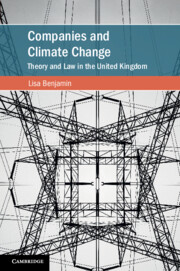Book contents
- Companies and Climate Change
- Cambridge Studies on Environment, Energy and Natural Resources Governance
- Companies and Climate Change
- Copyright page
- Dedication
- Contents
- Acknowledgements
- 1 Introduction
- 2 Theorising the Company in the Context of Climate Change
- 3 English Company Law and Climate Change
- 4 International and Transnational Climate Change Law and Policies
- 5 Domestic Climate and Energy Regulation
- 6 Companies, Human Rights and Climate Litigation
- 7 Fiscal Barriers and Incentives to Corporate Climate Action
- 8 Conclusion
- Index
8 - Conclusion
Published online by Cambridge University Press: 09 April 2021
- Companies and Climate Change
- Cambridge Studies on Environment, Energy and Natural Resources Governance
- Companies and Climate Change
- Copyright page
- Dedication
- Contents
- Acknowledgements
- 1 Introduction
- 2 Theorising the Company in the Context of Climate Change
- 3 English Company Law and Climate Change
- 4 International and Transnational Climate Change Law and Policies
- 5 Domestic Climate and Energy Regulation
- 6 Companies, Human Rights and Climate Litigation
- 7 Fiscal Barriers and Incentives to Corporate Climate Action
- 8 Conclusion
- Index
Summary
This concluding chapter ties together the various elements of regulatory and market-based developments covered earlier in the book and the impacts they have on dominant corporate norms. International consensus shifting on climate change indicates that these dominant theories and norms have become outdated, and should be adapted to reflect broader public and private investor concerns around climate change. The systemic risks of climate change are proving to be a market driver for reallocation of capital away from fossil fuel assets and towards a low or no carbon economy. Companies themselves are reacting with net-zero emissions targets, although these approaches mainly cabin climate concerns to risk-based approaches. This chapter argues that public regulation is still needed to ensure corporate climate action protects not only profits but the public. It ends with two areas of likely future regulatory development – standardised disclosure obligations for companies on climate risk, as well as governance and strategy making by companies on climate change. It also advocates that companies hire climate expertise on an either an ad hoc or permanent basis to help directors reimagine the corporate purpose in the Anthropocene.
Keywords
- Type
- Chapter
- Information
- Companies and Climate ChangeTheory and Law in the United Kingdom, pp. 214 - 230Publisher: Cambridge University PressPrint publication year: 2021

